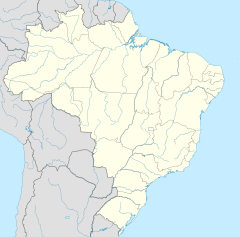| Church of Saint Francis of Assisi | |
|---|---|
Igreja de Sao Francisco de Assis Igreja da Pampulha | |
 Church of Saint Francis of Assisi, Pampulha | |
| General information | |
| Type | Church |
| Architectural style | Modernist |
| Town or city | Belo Horizonte, Minas Gerais |
| Country | Brazil |
| Coordinates | 19°51′30″S 43°58′44″W / 19.85833°S 43.97889°W |
| Completed | 1943 |
| Affiliation | Roman Catholic Archdiocese of Belo Horizonte |
| Technical details | |
| Floor count | 2 |
| Design and construction | |
| Architect(s) | Oscar Niemeyer |
The Church of Saint Francis of Assisi (Igreja de Sao Francisco de Assis, commonly known as the Igreja da Pampulha) is a chapel in Pampulha region of Belo Horizonte, in the state of Minas Gerais, southeastern Brazil. It was designed by the Brazilian architect Oscar Niemeyer in the organic modern style. It is the first listed modern architectural monument in Brazil and consists of four undulating concrete parabolas with outdoor mosaics. The interior hosts a mural by Candido Portinari, and the exterior features a landscape designed by Roberto Burle Marx.[1]
The curved lines of the church enchanted artists and architects, but scandalized the city's conservative culture. Despite its completion in 1943 and Juscelino Kubitschek's call for its consecration, the church was not consecrated until 1959. For 14 years, the ecclesiastical authorities—led by Antonio dos Santos Cabral, the Archbishop of Belo Horizonte—prohibited the chapel from providing Catholic services.[2]
As of July 2016, the church is classified as a UNESCO World Heritage Site, part of the Pampulha Modern Ensemble, a collection of Niemeyer buildings in Pampulha.[3]
- ^ Cite error: The named reference
hepnerwas invoked but never defined (see the help page). - ^ "Folha Online - Cotidiano - Igrejinha da Pampulha (MG) será novamente recuperada - 21/10/2003". www1.folha.uol.com.br. Retrieved Feb 12, 2020.
- ^ Cite error: The named reference
unescowas invoked but never defined (see the help page).
